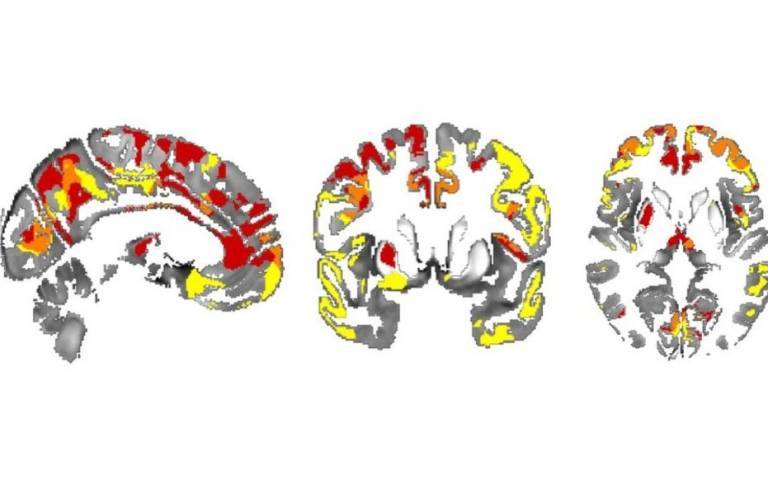The Link Between Brain Iron, ADHD, And Cognitive Decline With Age

Table of Contents
The Role of Brain Iron in Cognitive Function
Brain iron plays a crucial role in maintaining optimal cognitive function. Its presence is essential for various processes vital to brain health.
Iron's Crucial Role in Brain Development and Function
Iron is a vital mineral for several key processes in the brain:
- Neurotransmitter Production: Iron is essential for the synthesis of crucial neurotransmitters like dopamine, serotonin, and norepinephrine, which regulate mood, attention, and motor control. Imbalances in these neurotransmitters are implicated in various neurological disorders.
- Myelination: Myelin, the protective sheath surrounding nerve fibers, requires iron for its proper formation and maintenance. Healthy myelination is crucial for efficient nerve impulse transmission, impacting cognitive speed and processing.
- Brain Structure and Function: Iron is involved in the development and maintenance of various brain regions, including the hippocampus (involved in memory) and prefrontal cortex (involved in executive functions like planning and decision-making).
Iron Imbalance and its Consequences
Both iron deficiency and iron overload can severely impact cognitive function.
- Iron Deficiency: Symptoms include fatigue, impaired concentration, difficulty focusing, and general cognitive impairment. These symptoms overlap significantly with those of ADHD, raising questions about a potential link.
- Iron Overload: Excess iron can lead to oxidative stress, damaging brain cells and increasing the risk of neurodegenerative diseases. Symptoms can range from fatigue and joint pain to more severe neurological problems. Monitoring ferritin levels (a protein that stores iron) is crucial for assessing iron status.
Brain Iron and Neurodegenerative Diseases
A growing body of research links elevated brain iron levels to an increased risk of neurodegenerative diseases such as Alzheimer's and Parkinson's.
- Alzheimer's Disease: Studies suggest that iron accumulation in specific brain regions contributes to the formation of amyloid plaques and neurofibrillary tangles, hallmarks of Alzheimer's disease.
- Parkinson's Disease: Iron overload in the substantia nigra, a brain region crucial for motor control, is implicated in the development of Parkinson's disease. Oxidative stress, partly driven by excess iron, contributes to the degeneration of dopamine-producing neurons.
ADHD and Brain Iron
The relationship between brain iron and ADHD is an emerging area of research.
The Potential Link Between ADHD and Iron Levels
Several studies suggest a correlation between altered iron metabolism and ADHD. However, more research is needed to establish a definitive causal link.
- Altered Iron Metabolism: Some studies have shown that individuals with ADHD may have abnormalities in their iron metabolism, leading to either iron deficiency or iron overload in certain brain regions.
- Genetic Predisposition and Environmental Factors: Further investigation is needed to understand the interplay between genetic predisposition and environmental factors in influencing iron levels and their relation to ADHD.
ADHD Symptoms and Iron Deficiency
Iron deficiency could potentially exacerbate several core ADHD symptoms.
- Inattention: Iron deficiency can lead to fatigue and reduced cognitive function, potentially worsening difficulties with attention and focus.
- Impulsivity: Impaired executive function, partly due to iron deficiency, might contribute to increased impulsivity and difficulty with self-regulation.
- Hyperactivity: While the direct link is less clear, iron deficiency's impact on energy levels and overall cognitive function could potentially influence hyperactivity.
Treatment Implications
While iron supplementation might seem like a straightforward solution, it's crucial to proceed with caution. Iron supplementation should only be considered under the guidance of a healthcare professional, following proper diagnosis and careful monitoring of iron levels. Self-medicating can be harmful.
Brain Iron and Age-Related Cognitive Decline
As we age, the accumulation of brain iron can significantly contribute to cognitive decline.
The Accumulation of Iron with Age
Iron accumulates in the brain over time, leading to a gradual increase in iron concentration. This accumulation is linked to several factors:
- Oxidative Stress: Iron can participate in the production of free radicals, leading to oxidative stress and damage to brain cells. This damage is exacerbated by aging.
- Lipofuscin: This age pigment, accumulating in brain cells, contains iron and is associated with age-related cognitive decline.
Iron and the Risk of Dementia
Research strongly suggests that excessive brain iron accumulation increases the risk of developing dementia, including Alzheimer's disease.
- Iron as a Risk Factor: Studies indicate a correlation between higher brain iron levels and an increased risk of dementia onset and progression.
- Mechanisms of Damage: The precise mechanisms by which iron contributes to dementia are still under investigation, but oxidative stress and inflammation play significant roles.
Strategies for Maintaining Healthy Brain Iron Levels as We Age
Maintaining healthy brain iron levels throughout life is essential for preserving cognitive function:
- Diet: A balanced diet rich in iron-rich foods (lean meats, leafy green vegetables, legumes) is crucial.
- Regular Exercise: Physical activity promotes overall health and potentially improves iron metabolism.
- Antioxidants: A diet rich in antioxidants can help combat oxidative stress associated with iron accumulation.
Conclusion
The role of brain iron in cognitive health is undeniable. This article highlights the potential link between iron imbalance and ADHD, as well as the association between iron accumulation and age-related cognitive decline. While more research is needed to fully understand these complex relationships, maintaining healthy brain iron levels throughout life is critical for optimal cognitive function. If you have concerns about your brain iron levels, especially if you have ADHD or are experiencing cognitive changes, consult with your healthcare provider. Consider getting blood tests to assess your iron levels and discuss appropriate strategies for maintaining healthy brain iron levels for optimal cognitive health. Remember, proactive management of your brain's iron balance may significantly impact your cognitive well-being throughout your lifespan.

Featured Posts
-
 Huaweis Exclusive Ai Chip A Bid For Global Ai Market Share
Apr 29, 2025
Huaweis Exclusive Ai Chip A Bid For Global Ai Market Share
Apr 29, 2025 -
 Invest Smart Identifying Promising New Business Locations Nationwide
Apr 29, 2025
Invest Smart Identifying Promising New Business Locations Nationwide
Apr 29, 2025 -
 Texas Resident Killed In Wrong Way Car Accident Near State Line
Apr 29, 2025
Texas Resident Killed In Wrong Way Car Accident Near State Line
Apr 29, 2025 -
 April 8th Treasury Market Update Important Developments
Apr 29, 2025
April 8th Treasury Market Update Important Developments
Apr 29, 2025 -
 Growth In Grief Fort Belvoir Honors Soldiers Killed In Dc Helicopter Crash
Apr 29, 2025
Growth In Grief Fort Belvoir Honors Soldiers Killed In Dc Helicopter Crash
Apr 29, 2025
